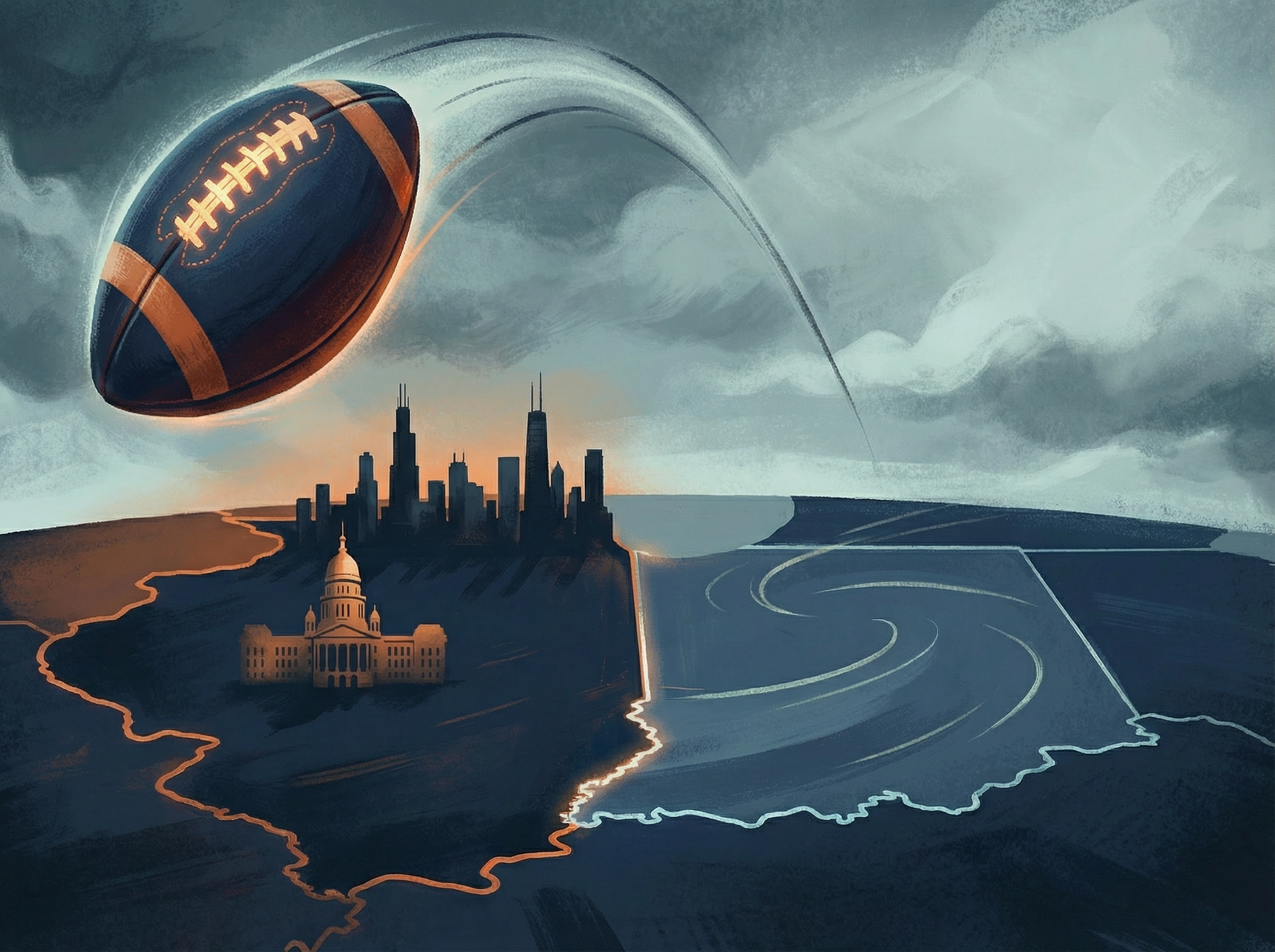The Milwaukee Brewers eliminate the Chicago Cubs from the playoffs, clinching their spot in the National League Championship Series. Like most Cub fans I wasn’t expecting much this season and felt like the Cubs were playing with house money having gotten to a decisive Game 5 in the NLDS. So while the loss stung a bit, it wasn’t unexpected. In fact, I was considering rooting for the Brewers in their upcoming NLCS with the Dodgers. And then I saw a post from MLB’s account on X.
In the video players gather for the traditional team photo. But former Cub Trevor Megill holds an “L flag”, a white flag with a blue “L,” (I’m told the “official L flag” is a blue background and white “L”) mocking the iconic Cubs “W flag” that’s flown at Wrigley Field after victories for decades.
My first reaction was visceral disgust. I declared the Brewers classless on social media. How petty. How bush league. They’re heading to face the Los Angeles Dodgers, the reigning World Champions with the largest payroll in baseball, and they’re still obsessed with mocking the team they just beat?
But a few hours later, a different question emerged: Why couldn’t they just celebrate their own achievement? What was missing that required humiliating Chicago to feel satisfied?
That question matters beyond baseball. Because resentment—the kind that demands your enemy’s humiliation, not just your own success—is poison. And the Brewers drank it at exactly the moment they should have been savoring pure victory.
When Rivalry Stays Within Bounds
I’ve been to dozens of Cubs games at American Family Field (formerly known as Miller Park). I was also lucky enough to be at Game 4 of the 2015 NLDS with the St. Louis Cardinals at Wrigley Field. I’ve experienced the intensity of rivalry in person, not just on television. And I can tell you: not all rivalries are created equal.
The Cubs-Cardinals rivalry is among the oldest and most storied in baseball—over 2,400 games dating back to 1885. Geography and economics drove it from the start. No other National League team occupied the upper Midwest until Milwaukee got the Braves (briefly) and then the Brewers. The Cardinals’ KMOX radio signal reached south and west. The Cubs’ WGN reached north through Wisconsin and Iowa. The rivalry was about territorial rights, and both teams built massive regional followings.
At 130+ years, and as of the writing of this article, the Cubs recently took back the lead in the series 1,284-1,227-19. That’s genuine competitive balance over more than a century. Championships have swung both ways, though Cardinals fans enjoyed decades of dominance while Cubs fans suffered through 108 years without a World Series title.
Yet somehow, respect survived the intensity.
In 1998, Mark McGwire hit his 62nd home run of the season against the Cubs to break the single-season record. As he rounded the bases, Cubs infielders congratulated him. They celebrated an opponent’s historic achievement even though it came at their expense. That’s security.
In 2015, the Cubs and Cardinals met in the postseason for the first time in their long rivalry. I was at Game 4 of the NLDS when the Cubs eliminated the Cardinals, ending decades of St. Louis dominance in the division. The celebration was electric and cathartic. But it was forward-looking—the NLCS with the Mets awaited. Nobody waved a mock Cardinals flag. Nobody made the moment about humiliating St. Louis.
Cardinals fans sitting near us that night offered handshakes. “Good luck” they said (you can even see this throughout the stands in several videos), and meant it. There was disappointment, sure, but also grace. The rivalry was bounded by mutual respect—both franchises are secure enough that they don’t need to diminish each other to feel legitimate.
The Cubs-Brewers rivalry? Not so much.
The Economics of Resentment
I need to be honest about my perspective here: I’m a Chicago transplant living in Wisconsin for 14 years. My wife’s family are Wisconsin natives who root for the Brewers. We held 20-game season tickets to Brewers games for several years. I’ve experienced this rivalry from an uncomfortable middle position—welcomed as a season ticket holder paying premium prices for Cubs games, mocked as a Cubs fan on the scoreboard and in the stands.
That positioned perspective matters because understanding the Cubs-Brewers dynamic requires understanding what drives it: economics and structural disadvantage.
The Milwaukee Brewers operate in the smallest market in Major League Baseball—1,689,572 people. Their 2025 payroll was approximately $117-146 million depending on how you calculate it, ranking 21st to 23rd out of 30 teams. The Los Angeles Dodgers, whom they’re about to face, have a luxury tax payroll exceeding $350 million—“barely a third” of which covers Milwaukee’s entire roster.
The Wall Street Journal framed the upcoming Brewers-Dodgers NLCS as “more than a World Series berth at stake”—it’s “a stress test for MLB’s entire financial model”. Can the smallest market compete with the richest?
The Brewers have, remarkably, done exactly that. They’ve made the playoffs six times since 2018 despite their payroll constraints. They finished 97-65 in 2025, the best record in the National League. ESPN called them a “$115 million powerhouse”. They’ve succeeded through strategic brilliance—undervalued acquisitions, defensive excellence, and speed over power.
But success on a budget comes with constraints. And those constraints breed resentment.
Enter the Cubs—the big-market team 90 miles south with a massive national following built over decades of WGN superstation broadcasts. Cubs fans travel. We fill opposing stadiums everywhere, but especially at American Family Field in Milwaukee, close enough to reach in 90 minutes up Interstate 94.
The phenomenon became known as “Wrigley North.” During my years as a Brewers season ticket holder, I saw it firsthand: Cubs games were designated premium games in the ticket plan, priced higher than other opponents. The Brewers would send emails asking season ticket holders not to sell Cubs tickets on the open market—a request that makes sense from their perspective but reveals the bind they’re in. They need the revenue Cubs fans bring (the stadium fills completely for Cubs games when other matchups struggle), but they resent that they need it.
For late-season games with playoff implications, the Brewers would restrict pre-sale tickets to Wisconsin residents only. I understand the business logic. I also understand the underlying emotion: We don’t want Chicago fans taking over our building.
The resentment intensified dramatically when Craig Counsell, the Brewers’ highly successful manager and Milwaukee native who still lives in Whitefish Bay, left for the Cubs. The Brewers let him reach lame duck status on his contract, apparently believing his local ties would keep him loyal despite a better offer. Then Cubs president of baseball operations Jed Hoyer arrived with a five-year, $40 million deal making Counsell the highest-paid manager in baseball. Counsell took it. The Brewers were stunned. Fans called it betrayal.
But here’s the thing: the economic disadvantage the Brewers face is real, not imagined. Small-market teams operate under genuine structural constraints that big-market teams don’t face. Revenue sharing helps, but doesn’t eliminate the gap. Resentment growing from that reality is understandable.
The question is: what do you do with it?
The Poison We Drink
“Resentment is like drinking poison and waiting for the other person to die.” The phrase has been attributed to various sources—Saint Augustine, Malachy McCourt, Alcoholics Anonymous literature. Regardless of origin, the insight holds: resentment corrodes the resenter more than the resented.
Research on resentment reveals its toxic effects on those who harbor it. It distorts perception, creating a lens through which everything the resented person does appears malicious. It produces physical symptoms: depression, anxiety, hypertension, chronic muscle tension. It erodes relationships and personal wellbeing systematically over time.
Philosopher Myisha Cherry has written about the role of resentment in competitive sports—what she calls “chip on shoulder playing” or CSP. Athletes maintain “lasting grudge, controlled anger, and desire for non-moral payback at being overlooked, slighted, or underestimated”. This can motivate performance when controlled and channeled internally. The chip on your shoulder becomes fuel.
But there’s a crucial distinction between resentment as internal motivator and resentment as need to humiliate your opponent. The first drives you to prove yourself through achievement. The second requires your enemy’s degradation to feel satisfied.
The L flag crossed that line.
The Brewers achieved something genuinely impressive on October 11. They beat a Cubs team that massively outperformed expectations all season. They advanced to the NLCS for the first time since 2018. They validated years of strategic, budget-conscious roster construction. They proved the smallest market can compete with much larger ones. That achievement stands on its own merit.
But it wasn’t enough.
They needed to mock Chicago. They needed the L flag in the team photo. I’m not sure what Trevor Magill’s beef with the Cubs is or if he was just the one brave enough to hold up the flag. The Cubs picked him up in the Rule 5 draft just before COVID and he was awful in 2021, posting an 8.37 ERA and was put on waivers. But the Brewers needed everyone to see that they’d humiliated their rival. The victory itself—advancing to face the Dodgers with a World Series berth at stake—was insufficient to produce satisfaction.
That’s what resentment does. It defines your success by your enemy’s failure rather than your own achievement. Your victory becomes about them instead of you. You give your opponent power over your emotional state even in the moment of triumph. And you diminish what you’ve earned because you can’t enjoy it without settling scores.
When Winning Is Enough
Not all victories look like the L flag. Some athletes and teams are secure enough to win graciously.
In the 2008 Olympics, American sprinter Shawn Crawford finished fourth in the 200-meter final, then moved up to silver after two runners ahead of him were disqualified for lane violations. Rather than accept the medal, Crawford sent his silver to Churandy Martina—one of the disqualified runners—with a note: “I know this won’t replace the moment, but I want you to have this, because I believe it’s rightfully yours!”. Crawford acknowledged the achievement belonged to his opponent, not to a technicality.
After Clemson lost to Syracuse in 2017 as defending national champions, head coach Dabo Swinney walked into the Syracuse locker room after the game to congratulate the team that had just embarrassed his squad. A Syracuse player later reflected: “to be knocked down like that, but have the humility to come over and congratulate us when he didn’t have to…says a lot about who he is”.
At the Tokyo Olympics in 2021, with no fans in the stands due to COVID restrictions, the Australian Boomers gave Argentine legend Luis Scola a standing ovation in his final Olympic game. Opponents honored a competitor’s career. Scola hugged the Australian coach, waved at the Boomers bench, and cried.
When Viktor Axelsen defeated Chen Long in the badminton Olympic final, they spoke in Mandarin, hugged, and exchanged shirts. Axelsen later said: “I respect Chen a lot. He came over to my side of the court and told me I deserved it…He’s been a big inspiration to me”.
These are people secure enough to win without humiliation. The victory itself was enough.
The pattern is consistent: confident athletes and teams celebrate their own achievement. Insecure ones need to humiliate opponents to feel validated.
Testing My Own Reaction
I called the Brewers classless. I felt disgusted. I briefly considered rooting for the Dodgers out of spite.
Was I right to feel that way?
Here’s what I can’t control: The Brewers’ decision to wave that flag. MLB’s decision to post it widely on social media. The economic structure that creates small-market resentment. Craig Counsell’s choice to take more money from a bigger organization. The structural advantages big-market teams enjoy.
Here’s what I can control: Whether I let this poison my enjoyment of baseball. Whether I recognize Cubs fans can be insufferable too (we absolutely can—“Wrigley North” is itself dismissive). Whether I can watch the Brewers play the Dodgers without spite clouding my ability to appreciate good baseball.
The resentment test applies to me too. Am I drinking poison waiting for the Brewers to die? If I let this incident corrupt my ability to appreciate their achievement or enjoy watching the NLCS, haven’t I let resentment win?
I’m still working through this. The honest answer is: that flag stung. It stung because it was designed to sting. It was meant to humiliate Cubs fans at the Brewers’ moment of triumph. And it worked.
But I also recognize something uncomfortable: if the Cubs had waved an equivalent to the L flag (you can’t really call the W flag that, it’s been flown at Wrigley after wins for decades) after beating the Brewers, would I have objected? Be honest—I might have loved it. That double standard is the tribal thinking Test Your Impressions exists to examine.
The middle path is this: disappointment without righteousness. I can wish they’d been better without declaring moral superiority. I can recognize the economic resentment is real and understandable without endorsing the behavior it produces. I can acknowledge they diminished their own achievement while also acknowledging that Cubs culture isn’t innocent of triumphalism.
What Resentment Costs
The Brewers are about to face the Dodgers—a team with three times their payroll, multiple future Hall of Famers, and a recent World Series championship. It’s the ultimate test of whether the smallest market can compete with the richest. Every game will be a strategic chess match between Milwaukee’s efficiency and Los Angeles’s overwhelming talent advantage.
That’s the story. That’s what should have consumed their celebration. Instead, part of their energy went to mocking the team they’d already beaten.
Resentment has a cost. When you define your success by your enemy’s failure, you rob yourself of pure joy in your own achievement. When you need humiliation to feel satisfied, winning itself is never enough. When you drink the poison of grievance, it corrodes your ability to savor what you’ve earned.
The Brewers beat the Cubs. They’re headed to the NLCS. They’ve proven that smart, strategic, budget-conscious baseball can compete with big-market powerhouses. That achievement deserves celebration on its own terms.
The L flag was the poison they drank along the way. And the tragedy is: it wasn’t necessary. The victory was already theirs.





Comments